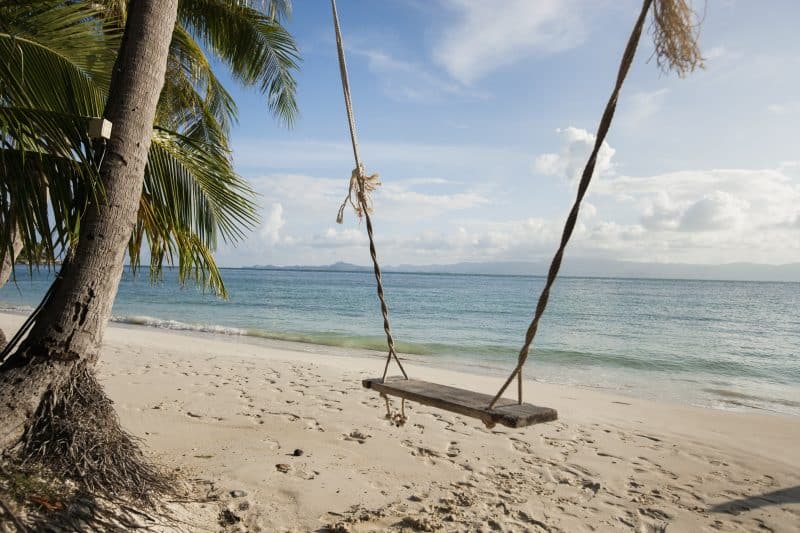The Caribbean offers more than just beautiful scenery; it provides a chance for a slower, more purposeful lifestyle where families can reconnect.
Many families worldwide are relocating to the islands due to the warm climate, strong sense of community, and financial benefits. The region offers a mix of relaxation and opportunity with its clean beaches, modern schools, and safe neighbourhoods.
If you want a healthier lifestyle, the freedom to work remotely, or a place to raise children closer to nature, the Caribbean could be the perfect new beginning for your family.
4 Reasons Why Families are Choosing Island Life
Families worldwide are seeking a change and choosing island life for its many benefits:
Financial and Residency Benefits
Moving to the Caribbean offers significant financial benefits for families. For instance, Dominica’s monthly living costs (excluding rent) are around £420, much lower than the U.K. average of £920 for similar expenses.
In St. Lucia, daily costs are about half what they are in the U.K. Even in more expensive islands like Antigua, living expenses are roughly 20 percent less than in the U.K.
Many Caribbean nations also have favourable tax laws. Most do not charge capital gains, inheritance (estate), or wealth taxes. Some countries, such as Antigua and Barbuda or St. Kitts and Nevis, also have no personal income tax for their citizens.
If you are wondering how to get Caribbean citizenship, several countries offer Citizenship by Investment (CBI) and Residency by Investment (RBI) programs. These include St. Kitts and Nevis, Dominica, Antigua and Barbuda, Grenada, and St. Lucia.
Here are typical minimum investment options:
- A non-refundable contribution to a government development fund, starting from around £80,000 (in Dominica, Antigua and Barbuda, or St Lucia).
- In St Kitts and Nevis, the minimum contribution for this option is approximately £200,000. This higher price point reflects the program’s premium status and long-standing reputation in the CBI market.
- Investors can also qualify by purchasing approved properties. Depending on the island and the chosen development, real estate investments usually start at £160,000 or higher.
These schemes usually allow you to include your spouse, dependent children, and sometimes even parents on a single application.
Beyond tax and citizenship advantages, they offer asset protection, long-term stability, and more options for where to live. This appeals to retirees, entrepreneurs, and families seeking security and flexibility.
The Lifestyle Advantage
Moving to the Caribbean can completely change how families live and experience life. The pace is slower, the air is cleaner, and the focus shifts to community, well-being, and connection. On islands like St. Lucia, Barbados, and Antigua, life is far more relaxed, creating space for family time, health, and shared moments.
Outdoor activities are a key part of the Caribbean culture. In St. Lucia, families can hike the Pitons, explore rainforest trails, or swim under waterfalls. Barbados encourages an active lifestyle with activities like jogging along the South Coast Boardwalk or surfing in the morning waves.
Antigua, known for its 365 beaches, offers plenty of opportunities for sailing, snorkelling, or simply walking by the shore as a family. These activities help strengthen family relationships and create lasting memories.
The Caribbean lifestyle also promotes healthier habits. Fresh tropical fruits, local fish markets, and constant sunshine support both physical and mental health. With less traffic and fewer distractions from city life, stress levels decrease, and people gain more personal time. Parents spend more evenings outdoors, children enjoy playing freely, and neighbours often form close friendships.
Living in the Caribbean is not just about slowing down. It is about finding balance, connecting with others, and appreciating the simple joys of daily life.
Family-Friendly Living and Education
Many Caribbean countries have excellent schools for families moving from the UK. These schools offer globally recognised qualifications, making it easier for children to transition academically.
For example, the Cayman International School provides both the American curriculum and the International Baccalaureate (IB) programme for students from nursery to sixth form. In other countries like Barbados, The Bahamas, and St Lucia, you can find schools that follow the British curriculum. These schools offer GCSEs and A-Levels, which provide a familiar academic path for children from the UK. They are also known for having small class sizes and strong student support.
Safety is another core strength in many Caribbean communities. Islands like Barbados, St. Lucia, and Antigua have relatively low crime rates and strong social connections. The neighbourhoods are often close-knit, where children can walk to their friends’ houses, parents know their neighbours, and schools act as community centers.
Access to healthcare has also significantly improved. The Cayman Islands, for example, require all residents to have health insurance, providing access to both public and private medical care.
The Bahamas has some of the best medical facilities in the region, with trained professionals and modern private hospitals available to expatriates. Many islands also have systems for medical evacuation and specialist care if needed.
Expat networks are very important for helping with the transition. Newcomers can connect with others through local social media groups, school parent associations, and online forums. These communities offer a valuable support system, helping families exchange advice and find trusted services.
Copyright: Unsplash I License: CC0 Domain
Cultural and Community Connection
Caribbean life is known for its warmth, hospitality, and strong cultural traditions. Newcomers quickly feel a sense of belonging on islands like St. Kitts, Barbados, and Grenada.
The region’s diverse heritage, shaped by African, European, and Indigenous influences, is evident in its festivals, music, and food. Families can join in year-round celebrations such as Carnival, Independence Day parades, and village fairs, which welcome both locals and expats.
Music and food are central to social life. Gatherings often feature lively rhythms from steelpan bands, reggae, and soca, filled with laughter. Sharing meals, which often include fresh seafood, plantains, and island spices, helps you connect with others instantly. You can also build friendships and contribute to their new community by volunteering at schools, youth centers, or environmental groups.
Moving to the Caribbean is not about being isolated. Instead, it is about becoming part of a lively society that values togetherness, respect, and shared happiness.
A New Chapter Under the Island Sun
Choosing the Caribbean is more than just a change of scenery. It is about embracing a balanced lifestyle filled with connection and opportunity. Many families who move here discover a renewed sense of energy, stronger relationships, and financial stability.



